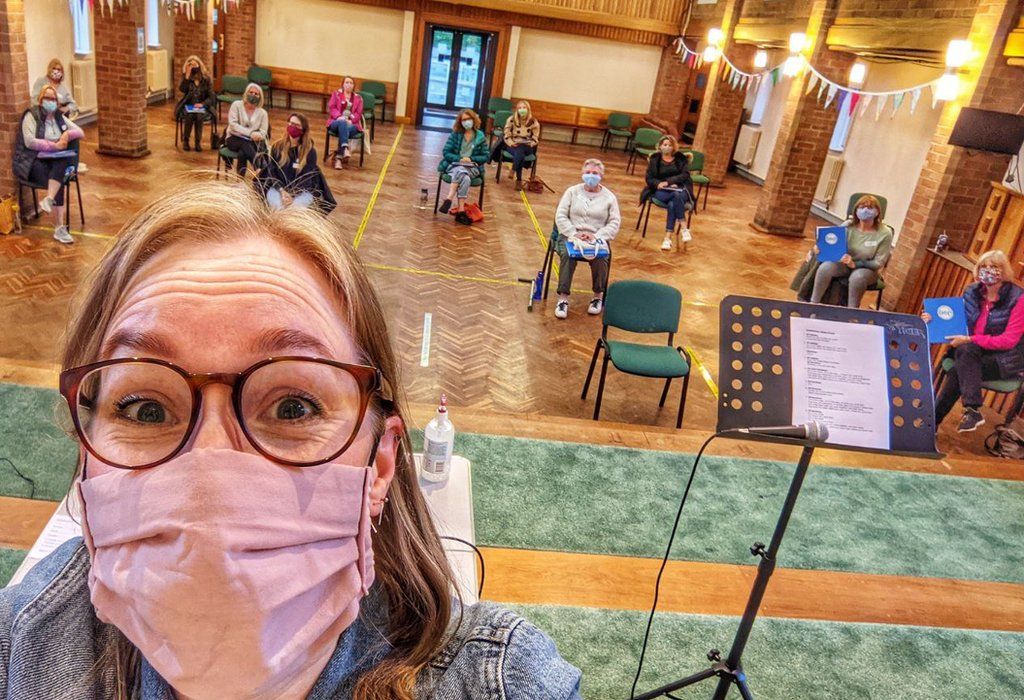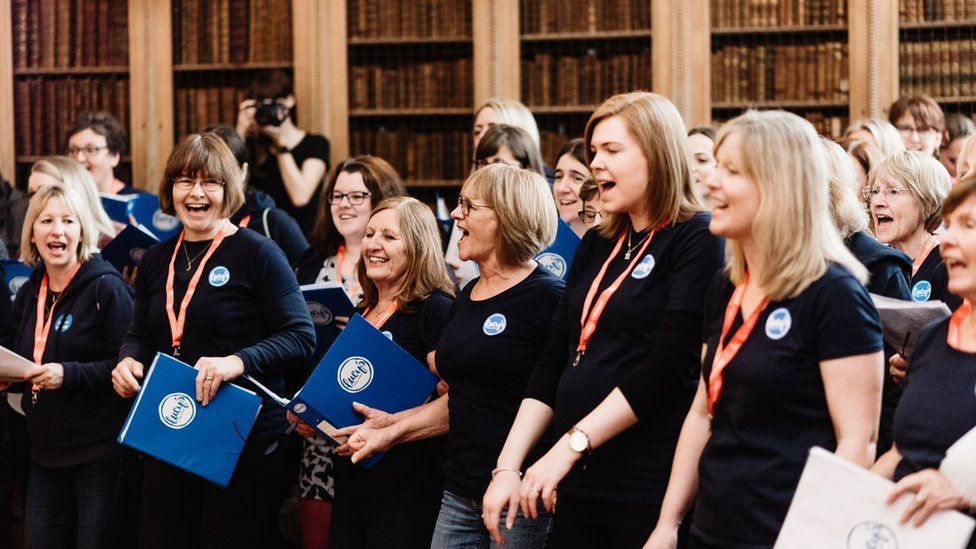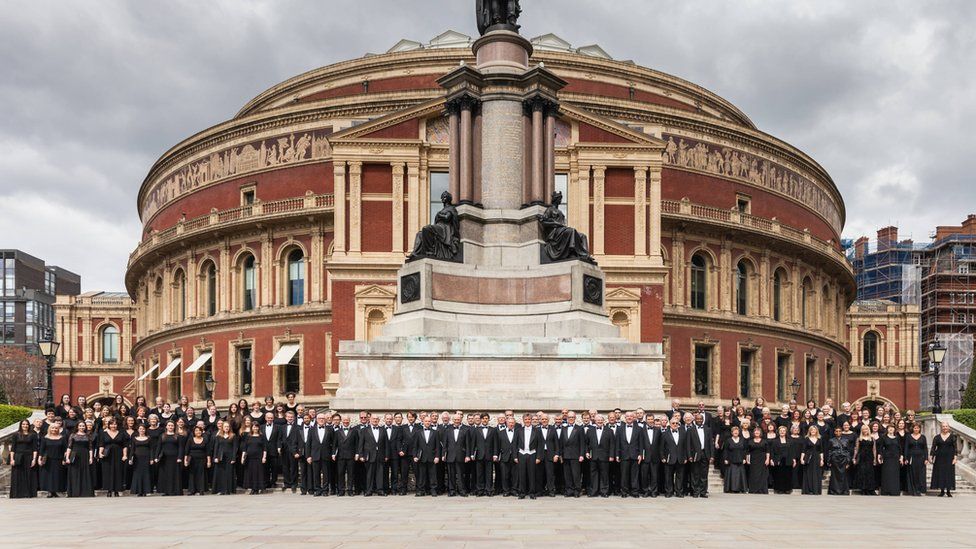Hundreds of choirs have had to cancel rehearsals after the government said singing poses a health risk.

image copyrightLucy’s Pop Choir
Last Monday, as lockdown restrictions eased, choir director Lucy McLean posted a selfie from her first real-life practice since October 2020.
“It might look like shock on my face but it was actually pure joy!” she wrote on Facebook. “I love my job so so much and it was an absolute pleasure to get back to it tonight.”
“There were about 15 of us there,” McLean tells the BBC, “and for one of the singers, it was the first time that she’d come back to the choir since the first lockdown.
“At the end, she said to me: ‘This has put a skip in my step for the first time in over a year'”.
The joy was short-lived.
A day after McLean’s emotional reunion, the government updated their guidelines, without warning, to say that amateur choirs in England could only gather in groups of six people indoors and 30 outdoors.
The ruling was as unexpected as it was unwelcome. Choirs had been working under the assumption that restrictions on rehearsals would be relaxed on 17 May, at the same time as shops, bars and hairdressers opened up.
Instead, they were given rules that were actually more draconian than the ones in place last September and October – when infection rates were higher, and no-one had been vaccinated.
“It was absolutely devastating,” says McLean, who runs four pop choirs in the north-east of England. “We cannot understand why this has been done.”

image copyrightSidney Ruiz
The Association of British Choral Directors called the last-minute change “disappointing… unreasonable and unworkable”.
In a statement, it said the advice “diverges from what we had been led to believe, that non-professional music activity would return outdoors and indoors in England from 17 May, without limits on numbers other than those dictated by the size of a venue,” it said in a statement.
The effects are wide-reaching. Across the UK, more than two million people regularly sing in 70,000 choirs,
In the House of Commons, culture secretary Oliver Dowden told MPs the decision to place new restrictions on their activities “was made on the basis of very clear public health guidance”.
According to the government’s website, “singing, shouting and physical activity increases the risk of transmission through small droplets and aerosols”. The more people involved, the higher the risk of transmission, which is why numbers are currently restricted.
But the science doesn’t back up the government’s position, according to Declan Costello, an ENT surgeon and chorister who has researched aerosol transmission – particles expelled when you talk, cough, sing – for Public Health England and the Department for culture, media and sport (DCMS).
His findings, published last summer, showed that singing does not produce substantially more respiratory particles compared to speaking at a similar volume – although the production of aerosols is increased when you speak or sing loudly.
At the time, Dowden welcomed the research (which has yet to be peer reviewed), saying it showed there were “no heightened risks” associated with singing or playing music.
Since then, Costello says he has not been made “aware of any new research that’s come through to show that singing is more dangerous now than it was a few weeks ago”.
“If there is new science that has come through over the last few months, it would be great to see – because nobody wants to put themselves or others at risk – but no evidence has been shown,” he told BBC Radio 4’s Today programme on Monday.
Voice coach Carrie Grant says the new rules are “unbelievably unfair” when other large-scale gatherings are being allowed in England.
“Professional singers can sing, people at sporting events can shout and yet an amateur choir have got to wait even longer to be able to get together,” she says. “It’s ridiculous. It’s totally ridiculous.
“If you think about pubs: As it gets louder and louder and louder, there’s way more aerosol being [produced] there than there would be in someone quietly singing behind a mask.”
PA MEDIA
-
England6 people indoors, 30 outdoors.
-
Wales30 indoors, 50 outdoors.
-
N Ireland15 indoors, 30 outdoors.
-
ScotlandIndoor rehearsals only permitted at Level 1 (mostly the islands). Up to 30 can rehearse outdoors at Level 2.
Source: BBC
For McLean, the new restrictions mean her “income has gone – again”.
After weeks of sorting out risk assessments and liaising with venues, the new rules wiped out a month of engagements. And although she’s been supported by the government’s self-employed grant for the last year, she says “it doesn’t quite come up to what I would have been making otherwise.”
Naveen Arles, who runs five choirs in London, says the new rules have had a similarly devastating impact on his members.
“Most people think it’s just a little hobby that’s been taken away but there’s a growing amount of science that shows the literally never-ending benefits of singing together.
“Let alone combatting social isolation, there are benefits to mental health, chronic pain, stress management, all of these things.”
Arles, whose work with choirs of inmates, refugees and cancer patients has earned him a British Citizenship Award, points out that the government has been running test events for pop concerts, nightclubs and sporting events, while ignoring choral societies.
“That’s a ridiculous state of affairs [because] during the gap between the lockdowns last year loads of choirs went back. They were in a room, distanced, they had all the measures in place and there were no outbreaks.”
Earlier this week, choristers across the country flooded social media with the hashtag #SingingMatters, posting photos and videos of Covid-safe rehearsals last year, and asking the government to clarify why the risks are considered greater now.



A petition has also been launched on the UK Parliament website, calling for the restrictions to be lifted. So far, 30,000 people have signed – about a third of the number needed to raise the issue in the House of Commons.
In the meantime, The Royal Choral Society – one of the country’s oldest and largest amateur choirs – is pressing ahead with plans to perform Handel’s Messiah at the Royal Albert Hall on 30 May.
Organisers are confident they are within the guidelines. Even though their singers are amateur, they maintain that “the environment is professional and the performers… will be behaving in a professional manner,” including taking Covid tests before and after the show.
“We stand with all choirs and singers who have been disappointed by the recent confusing advice from the DCMS, and we fully support the action being taking by musicians across the country to have the DCMS guidance clarified so that all amateur choirs can return to singing,” said the society in a statement.

image copyrightRoyal Choral Society
In response to the complaints, the government told the BBC: “We understand this is disappointing, but we must take a cautious and phased approach to easing restrictions.”
The guidance is set to be reviewed on 21 June – with the expectation that lockdown will be lifted and all limits on social interactions will be removed – but McLean says she’s trying not to build her hopes up.
“We’re nervous now. We don’t know what to expect. We can’t plan,” she says.
“We were trying to plan for 17 May and then we had it taken away. So I kind of want to plan for 21 June but, equally, I don’t want to, just in case I get heartbroken again.”

Follow us on Facebook, or on Twitter @BBCNewsEnts. If you have a story suggestion email entertainment.news@bbc.co.uk.